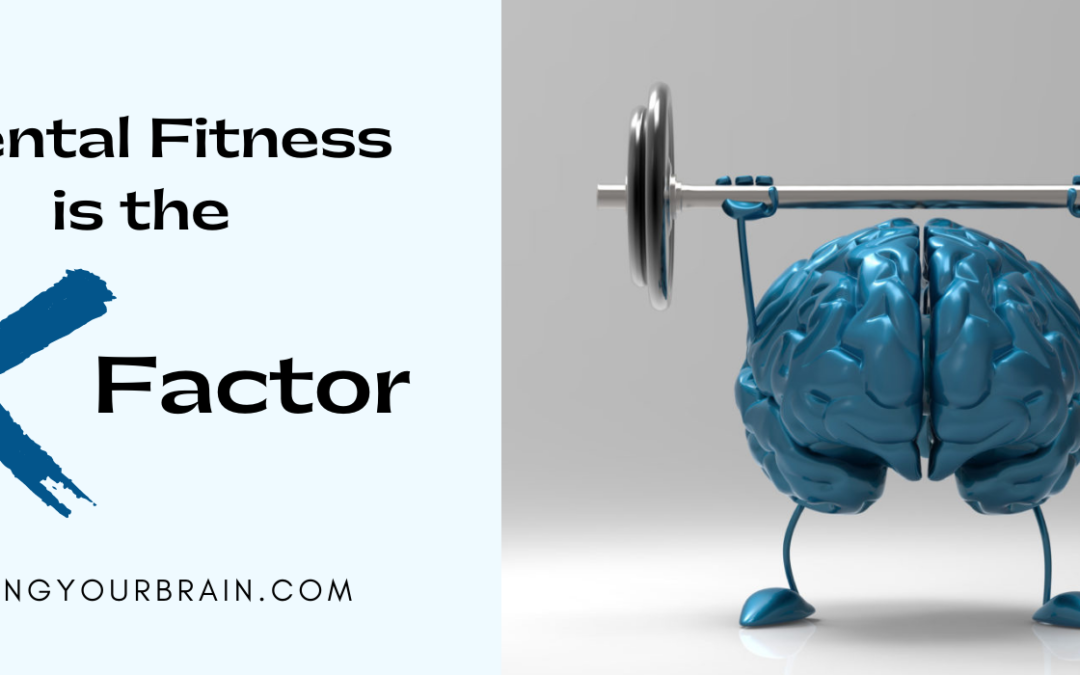Mental fitness can be defined as having and maintaining a state of well-being and cultivating awareness of how we think, behave and feel.
Just as physical fitness has its benefits us with an increased ability to respond to life in all its richness, mental fitness helps in the same way. It provides us more space to choose how to respond to any situation. Once you achieve optimal mental fitness, you have the X factor to navigate life’s challenges with ease.
It all starts with reprogramming the brain and training the brain to stay calm, focused, and aware of your surroundings. When you are mentally tired, you react out of control and feel strained or stressed. Low mental fitness levels means your mind is weak and tired, lacking oxygen to think clearly.
When you are more mentally fit, you recognize that you have a choice when that first angry statement comes your way. Mental fitness allows you to respond in the way you would like, in the moment, rather than having to reset or mend fences later. In some ways, it’s like accessing the wisdom of hindsight in the present moment.
How does fitness help mental health?
When we’re mentally fit, the way we interact with the world is different. It isn’t just one interaction with a friend or family member. It is the cumulative effect on our emotional health. Imagine being less reactive in all of the hundreds of interactions we have every week. We are choosing how to be and how to respond, rather than ping-ponging from one reaction to another. Over time, that adds up to a lot less stress and negative emotion.
In the same way that our physical fitness also affects our mental health, our mental fitness ultimately affects our physical health and wellness. Once you understand the importance of how the two work hand in hand, you are on your way to living an optimal life with focus, direction, and success.
How can you achieve optimal mental fitness?
At Saving Your Brain, many patients come to us with mental health symptoms and issues which require an initial brain assessment to diagnose which areas of the brain are weak and then we proceed with a custom program to synchronize the brain. Although you may not appear to have any symptoms, it’s always a good idea to find out what areas of the brain can work better. The brain is complex and every area of the brain controls our bodily functions from memory to responses. As you set goals to become physical fitter, schedule an appointment to scan your brain. You may be surprised about the results.
How does mental fitness work?
Our brains carry thoughts along neural pathways. These pathways are like ruts that have been created and reinforced over time. If you always take the same route to work, you may notice that you can get there on “autopilot.” When we repeat a certain thought pattern many times, that neural pathway is reinforced, and the thinking becomes automatic.
While a daily routine can be good, when it comes to our thought patterns, we need to be aware of what our routines are and what pathways we’re inadvertently reinforcing.
Automatic thinking comes from our survival brain which we refer to as the limbic system. It is constantly scanning the environment for threats and has been throughout evolution. We inherited the limbic system from chimps and it can protect us. But in the modern world, it can give rise to thoughts and actions that hurt us, too.
It is the human part of the brain that we can develop and synchronize your brain. With the same deliberateness that we strengthen certain muscles or fine-tune a movement, we can create neural pathways that better serve us and benefit our lives. This is the essence of what we mean by mental fitness training.
Our brain continues to grow

Neuroplasticity is the brain’s capacity to continue growing and evolving in response to life experiences. Plasticity is the capacity to be shaped, molded, or altered; neuroplasticity, then, is the ability for the brain to adapt or change over time, by creating new neurons and building new networks.
Historically, scientists believed that the brain stopped growing after childhood. But current research shows that the brain is able to continue growing and changing throughout the lifespan, refining its architecture or shifting functions to different regions of the brain.
The importance of neuroplasticity can’t be overstated: It means that it is possible to change dysfunctional patterns of thinking and behaving and to develop new mindsets, new memories, new skills, and new abilities.
Advanced Programs to Improve Mental Fitness

At Saving Your Brain, we have a plethora of mental fitness programs as we specialize in retraining the brain. We have children, moms, CEOs, and athletes using our advanced technologies. One of our favorites is Brain Tap.
Braintapping is a quick and easy way to relax, reboot and revitalize by simply optimizing your brain’s peak potential—anytime, anywhere. Backed by neuroscience and research, braintapping is proven to help people who experience high stress, difficulty sleeping, low energy, and other lifestyle challenges.
Braintapping guides your mind from an awake, reactionary mind into an intuitive, creative state, then to a place where super-learning and healing can occur, with the outcome being a heightened state of consciousness with crystal clear focus.
Brain tapping creates a symphony of brainwave activity, a feeling of calm focus that’s just right for learning and productivity. Each session is designed with brainwave balance in mind. Unlike meditation programs, BrainTap’s exclusive neuroalgorithms gently and naturally guide your brain through a broad range of brainwave patterns, instead of just the Alpha state. The result is a complete spectrum of brainwave activity.
Check out our other programs to learn more about how we can help you achieve total mental fitness by synchronizing your brain.


